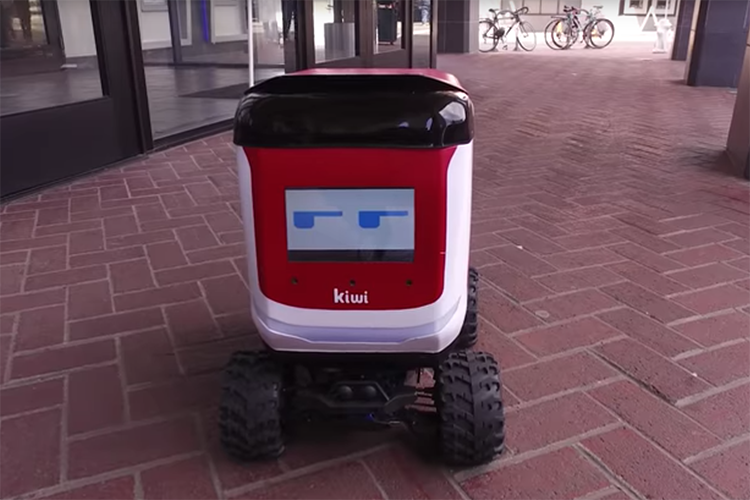Those four-wheeled robots on campus, explained
Campus startup Kiwi has delivered its 10,000th meal to hungry students, faculty and staff
May 31, 2018
The first time Felipe Chavez, the founder of a robot food-delivery company called Kiwi, visited Berkeley, he knew he wanted to start his company here.
Chavez was visiting a Berkeley student he’d hired as his first freelance engineer when he realized the busy college town offered the perfect mix of talented engineers, hungry college students eager to have a robot deliver their meals and city streets that are busy enough to put the robot’s self-driving programming through its paces.
“For me it is the best place to start a food delivery company,” the 28-year-old told Berkeley News. “We have very good talent, EECS students are very good, (and) you also have a very good gastronomic scene.”
So Chavez moved from his native Colombia to Berkeley and launched Kiwi, which recently delivered its 10,000th meal. Kiwi is part of the UC Berkeley’s Skydeck accelerator, which supports entrepreneurs with mentors, access to the university’s top minds and investments.
“Kiwi was born in in Berkeley,” Chavez said. “We actually created the first prototype in the MLK Student Union.”
The cooler-sized robots – the first prototype was launched a year ago – are often spotted winding their way across Sproul Plaza or down sidewalks. Students, staff and faculty can order from chains like Jamba Juice or Chipotle, or local spots like La Burrita or Cheese n’ Stuff.

Kiwibots can be spotted delivering food to students, faculty and staff on campus. The UC Berkeley-incubated company recently delivered its 10,000th meal.
The robots can travel almost anywhere in the area bounded by Cedar and Sacramento streets and Ashby and Piedmont avenues, including to UC Berkeley residence halls and campus buildings. Each delivery costs $3.80.
“We started with one robot going from the restaurant to the customer’s house, and we found out pretty fast that that was pretty inefficient,” Chavez said. “So we created a multi-modal system.”
Now, three types of robots get the food out of a restaurant and into a semi-autonomous tricycle that carries four tinier KiwiBot robots, which can each carry five meals.
“With the trikes … we pick up dozens of meals from restaurants, and then we load the robots and the robots deliver the last 200 meters,” he said.
Diners use an app to open the KiwiBot when it arrives outside. The average delivery takes 27 minutes, the company says.
When Berkeley News asked a KiwiBot to deliver a Jamba Juice smoothie Thursday afternoon, the robot missed our front door and ended up at a different door just across the street.
After a few texts with tech support, we got the lid open and found our medium Protein Berry Workout Smoothie still cold inside. Total time order to first sip, including hunting for the lost robot? 22 minutes. Total cost, including taxes and delivery fees? $11.22. (It would have cost $7.40 had we walked the round-trip mile to Jamba Juice.) Would we do it again? In a pinch, yes.
Chavez said Kiwi plans to expand to Los Angeles, Palo Alto and San Jose by the end of 2018. But he doesn’t see leaving Berkeley anytime soon.
“Berkeley, it is incredible, because it is a college town — so you have a ton of students with new ideas,” he said. “The second part is that the cultural experience is very nice. The vibe you have in Berkeley, you don’t have it in other places. And the weather is better than San Francisco.”
Contact Will Kane at [email protected]